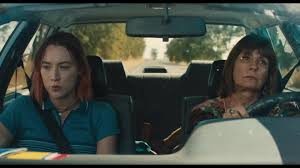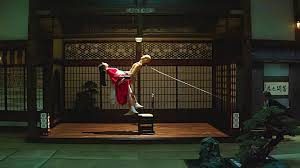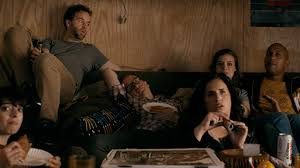MOTHER’S INFERIOR AND SUPERIOR: Movie Reviews of Lady Bird and Noviate by Howard Casner
Posted: December 17, 2017 | Author: Donald | Filed under: Uncategorized | Tags: Diana Agron, Greta Gerwig, Lady Bird, Laurie Metcalf, Lois Smith, Lucas Hedges, Margaret Betts, Melissa Leo, Novitiate, Saoirse Ronan, Timothée Chalamet, Tracy Letts | 3,835 Comments » First, a word from our sponsors: I am now offering a new consultation service: so much emphasis has been given lately to the importance of the opening of your screenplay, I now offer coverage for the first twenty pages at the cost of $20.00. For those who don’t want to have full coverage on their screenplay at this time, but want to know how well their script is working with the opening pages, this is perfect for you. I’ll help you not lose the reader on page one.
First, a word from our sponsors: I am now offering a new consultation service: so much emphasis has been given lately to the importance of the opening of your screenplay, I now offer coverage for the first twenty pages at the cost of $20.00. For those who don’t want to have full coverage on their screenplay at this time, but want to know how well their script is working with the opening pages, this is perfect for you. I’ll help you not lose the reader on page one.
Ever wonder what a reader for a contest or agency thinks when he reads your screenplay? FosCheck out my new e-book published on Amazon: Rantings and Ravings of a Screenplay Reader, including my series of essays, What I Learned Reading for Contests This Year, and my film reviews of 2013. Only $2.99. http://ow.ly/xN31r
and check out my Script Consultation Services: http://ow.ly/HPxKE
Warning: SPOILERS
 I think I will begin this review with a personal anecdote. Years ago, I was in the audience for one of the final previews for Stephen Sondheim’s musical Merrily We Roll Along, a tale told in reverse about three friends who betray the ideals they had when just starting out. It was a disaster. An unmitigated one at that. And it closed, I believe, around two weeks after it opened, if it lasted that long.
I think I will begin this review with a personal anecdote. Years ago, I was in the audience for one of the final previews for Stephen Sondheim’s musical Merrily We Roll Along, a tale told in reverse about three friends who betray the ideals they had when just starting out. It was a disaster. An unmitigated one at that. And it closed, I believe, around two weeks after it opened, if it lasted that long.
It was so terrible, I though the songs, with a couple of exceptions, were not just Sondheim’s worst, they were just bad.
A year later, I was in the cutout section of a record store (remember those?) and I ran across a cast recording for the show. I bought it and listened to it anew and realized the songs were wonderful and that it had been the production that was, well, let us be kind and say…lacking. Read the rest of this entry »
Les Girls Encore: Movie Reviews of The Handmaiden, Certain Women, Aquarius, Denial and Christine by Howard Casner
Posted: November 4, 2016 | Author: Donald | Filed under: Uncategorized | Tags: Andrew Scott, Antonio Campos, Aquarius, Certain Women, Chan-wok Park, Christine, Craig Shilowich, David Hare, Deborah Lipstadt, Denial, James Le Gros, Jared Harris, Jin-woong Jo, John Cullum, Jung-woo Ha, Kelly Reinhardt, Kim Tae-ri, Kleber Mendoza Filho, Kristen Stewart, Laura Dern, Lily Gladstone, Michael C. Hall, Michelle Williams, Min-hee Kim, Rachel Weiss, Rebecca Hall, Rene Auberjonois, Sonia Braga, Soto-Kyung Chung, The Handmaiden, Timothy Spall, Tom Wilkinson, Tracy Letts | 1 Comment »For questions: hcasner@aol.com
First, a word from our sponsors: I wanted to say thank you to everyone who contributed to our Indiegogo campaign for 15 Conversations in 10 Minutes. We did very well due to you folks. For those who weren’t able to give, keep us in your thoughts. And if you are able to contribute in the future, contact me and I’ll tell you how. I will even honor the perks on the original campaign.
I am now offering a new consultation service: so much emphasis has been given lately to the importance of the opening of your screenplay, I now offer coverage for the first twenty pages at the cost of $20.00. For those who don’t want to have full coverage on their screenplay at this time, but want to know how well their script is working with the opening pages, this is perfect for you. I’ll help you not lose the reader on page one.
Ever wonder what a reader for a contest or agency thinks when he reads your screenplay? FosCheck out my new e-book published on Amazon: Rantings and Ravings of a Screenplay Reader, including my series of essays, What I Learned Reading for Contests This Year, and my film reviews of 2013. Only $2.99. http://ow.ly/xN31r
and check out my Script Consultation Services: http://ow.ly/HPxKE
Warning: SPOILERS
 In my last review, I mentioned that a number of films opened with women as the central character. This week, this trend continues with five more. And now that fall is upon us and productions companies and distributors are going to begin release of films to qualify for the Academy Awards, we should see a number more as everyone races for a Best Actress nod.
In my last review, I mentioned that a number of films opened with women as the central character. This week, this trend continues with five more. And now that fall is upon us and productions companies and distributors are going to begin release of films to qualify for the Academy Awards, we should see a number more as everyone races for a Best Actress nod.
The lesson I suppose is don’t look for female driven movies from Hollywood and the studios, but from independent and art films and the prestige pictures at year’s end.
The Handmaiden is a new import from South Korea, one of the two countries that, along with Romania, are producing the most interesting films internationally. It is based on Fingersmith, a thriller by Welsh (and lesbian) writer Sarah Waters that in the novel takes place in Victorian era Britain, but has been switch to 1930’s Japanese occupied Korea because, well, little is more universal than murder and other nasty deeds.
To show how pretentious moi can be, The Handmaiden is as if James Cain wrote Victorian pornography using a Rashomon type structure. Read the rest of this entry »
THE NAZIS ARE COMING, THE NAZIS ARE COMING: Movie Reviews of Imperium, Anthropoid and The People v. Fritz Bauer by Howard Casner
Posted: September 2, 2016 | Author: Donald | Filed under: Uncategorized | Tags: and Toby Jones, Anthony Frewin, Anthropoid, Burghart Klaussner, Cillian Murphy, Daniel Radcliffe, Daniel Ragussis, Imperium, Jamie Dornan, Lars Krause, Olivier Geez, Rudiger Klink, Sam Trammell, Sean Elli, The People vs. Fritz Bauer, Toni Collette, Tracy Letts | 1,847 Comments »For more information, contact hcasner@aol.com
First, a word from our sponsors: I am now offering a new service: so much emphasis has been given lately to the importance of the opening of your screenplay, I now offer coverage for the first twenty pages at the cost of $20.00. For those who don’t want to have full coverage on their screenplay at this time, but want to know how well their script is working with the opening pages, this is perfect for you. I’ll help you not lose the reader on page one.
Ever wonder what a reader for a contest or agency thinks when he reads your screenplay? Check out my new e-book published on Amazon: Rantings and Ravings of a Screenplay Reader, including my series of essays, What I Learned Reading for Contests This Year, and my film reviews of 2013. Only $2.99. http://ow.ly/xN31r
and check out my Script Consultation Services: http://ow.ly/HPxKE
Warning: SPOILERS
 In the 1970’s Hollywood on, people were having trouble coming up with an acceptable background for villains. Critics and audiences were becoming more and more resistant to the idea that the bad guys had to be a member of a minority group.
In the 1970’s Hollywood on, people were having trouble coming up with an acceptable background for villains. Critics and audiences were becoming more and more resistant to the idea that the bad guys had to be a member of a minority group.
What was a filmmaker who liked to use shorthand to create characters rather than create in-depth individual to do?
Well, George Romero gave us the living dead. Steven Spielberg gave us a shark (which is only fair since he soon took away aliens as bad guys with E.T. and Close Encounters of the Third Kind, not to return space creatures to their evil glory until War of the Worlds).
But perhaps the filmmaker we should be most grateful to is George Lucas who gave us the most villainous of all villains, the Nazi, in the Indiana Jones franchise.
After all, other than Trump supporters, who likes Nazis? Read the rest of this entry »
BETTER LATE THAN CRAP: Movie Reviews of The Innocents, Wiener-Dog and Hunt for the Wilderpeople by Howard Casner
Posted: July 30, 2016 | Author: Donald | Filed under: Uncategorized | Tags: Absolutely Fabulous: the Movie, Agatha Kulesza, Alice Vial, Anne Fontaine, Au hazard Balthazar, Danny Devito, Eagle vs. Shark, Ellen Burstyn, Greta Gerwig, Housebound, Hunt for the Wilderpeople, Ida, Julian, Julie Delpy, Keaton Nigel Green, Kieran Culkin, of Flight of the Concords, Pascal Bonitzer, Pawel Pawlikowski, Rachel House, Rima Te Waititi, Sabrina B Marine, Sam Neill, Star Trek Beyond, Taikia Waititi, The Innocents, Tracy Letts, Weiner-Dog, What We Do in the Darkness, Zosia Mamet | 4 Comments »First, a word from our sponsors: I am now offering a new service: so much emphasis has been given lately to the importance of the opening of your screenplay, I now offer coverage for the first twenty pages at the cost of $20.00. For those who don’t want to have full coverage on their screenplay at this time, but want to know how well their script is working with the opening pages, this is perfect for you. I’ll help you not lose the reader on page one.
Ever wonder what a reader for a contest or agency thinks when he reads your screenplay? Check out my new e-book published on Amazon: Rantings and Ravings of a Screenplay Reader, including my series of essays, What I Learned Reading for Contests This Year, and my film reviews of 2013. Only $2.99. http://ow.ly/xN31r
and check out my Script Consultation Services: http://ow.ly/HPxKE
Warning: SPOILERS
 I know I’m a little late with reviews of the above titled films. I got behind in work and I wasn’t sure when I was ever going to get back to blogging and even thought of bypassing these movies since some of them have passed from the theaters.
I know I’m a little late with reviews of the above titled films. I got behind in work and I wasn’t sure when I was ever going to get back to blogging and even thought of bypassing these movies since some of them have passed from the theaters.
But last week two major tentpole type films opened the same weekend, Absolutely Fabulous: the Movie and Star Trek Beyond, and both are crap. No, they are worse than that. They are crappity crap crap crap.
So I thought I owed it to the other movies to share my views. I mean, how can I justify passing up these three movies when I’m going to eventually review crap?
So, let’s begin.
In the early sixties Poland had, what was termed in the biz, a new wave, a group of emerging filmmakers who had something unique and fresh to say (or at least tried, the country was still a Russian satellite at the time). Directors and writers like Roman Polanski, Andrzej Wajda, Krzysztof Zanussi and Krzysztof Kieslowski burst on the scene with an exciting outpouring of new work like Knife in the Water, Ashes and Diamonds, The Contract and Camera Buff. Read the rest of this entry »
Movie Review of AUGUST: OSAGE COUNTY by Howard Casner
Posted: January 1, 2014 | Author: Donald | Filed under: Uncategorized | Tags: August: Osage County, Chris Cooper, Julia Roberts, Margo Martindale, Meryl Streep, Pacific Rim, Tracy Letts | 2,313 Comments »Pacific Rim is a big, expensive through the whazoo, blockbuster, tent pole film that was cast with second tier actors (or less), because, I suspect, after all the money was allotted for CGI (probably equal to the gross national product of all third world countries combined), there wasn’t anything left for A-listers. August: Osage County was made on a much more modest budget, which means they could fill the cast with top of the line Academy Award nominees and winners and other actors who critics have been raving about and who are hot, hot, hot.
Well, the budget may have been less, and the actors greater, but the size of the disaster feels exactly the same.
I’m sure it all seemed like a good idea at the time, taking a critically acclaimed play (a Pulitzer Prizer at that) that was hugely successful on Broadway and fill it with plenty of Hollywood royalty to make the audience swoon. After all, it worked for Grand Hotel and Dinner at Eight, didn’t it? Hell, I’d have done it. Who wouldn’t have? And it stars Meryl Streep, too, for God’s sake. Who could resist?
And it should have worked. It has all the right ingredients. It screams to be a memorable and searing drama of a dysfunctional family.
But to quote a friend of mine, “it’s a mess”. And he’s right. I mean, it’s a real mess. And the result is A Long Day’s Journey Into Night lite. No, it’s a bit worse than that. It’s Long Day’s Journey… without caffeine and salt as well. It’s about as blanded down and derivative as one can get.
Everyone who doesn’t like the movie seems to be pointing their finger at Streep herself, saying that her over the top, ham fisted performance as pill popping, vicious, Bette Davis-channeled, matriarch Violet Weston just bulldozes over everybody and everything in her path. But I have to strongly disagree. I’m not convinced there’s anything essentially wrong with her or her acting. Indeed, I posit that she’s as good as she’s ever been.
I also sort of think that she’s getting bad press because she’s been so good for so long, people are desperate to take her down a peg or two—“finally, Streep gives less than a stellar performance, we can die now”.
No, I think the essential problem is not her interpretation, but the character itself.
The screenplay, written by Tracy Letts and adapted from his own play, has this supposed force of nature at its center, but a force of nature that doesn’t seem to have a reason for acting the way she does. She has her whole family gathered around her, everybody together for the first time in who knows how many years, but what does she want from them? What does she want to do to them while they are there? What is she hoping to get out of it? I had absolutely no idea.
In fact, I found her to be pretty forceless, full of sound and fury, but not signifying much of anything when it came down to it.
And there’s a key scene that I believe demonstrates what I’m getting at. At the funeral lunch, Violet suddenly, out of nowhere, insists that grace be said. But why? What is her motivation (as they say in the biz)? What does she hope to achieve or get out of it? I mean, I know why Letts includes it; it’s a pretty cheap laugh. But I had absolutely no idea why Violet asked for it, so the scene just seems so…purposeless.
And for the whole of the movie, every action of Violet’s seems constrained by this same problem. It feels as if she’s supposed to be in the driver’s seat of the story, determining where everything is going, but she can’t find the GPS, until finally I started thinking of that theater joke when the method actor asks what his motivation is and the director says, your paycheck at the end of the week. That she’s able to do anything with the part I think is a tribute to her ability.
The other characters also have the same issue at times. Why they put up with this crazy person at the head of the table when they know she’s high as a kite and is acting completely irrational was something of a mystery to me. The screen door is right there and, as the screenplay is written, now that the funeral is over, there’s nothing really keeping them there. After all, most of them haven’t been home for years. If they had no problem leaving before, what’s keeping them there now? Everyone sticks around, but no one seems to have a reason to, psychologically or practically.
So, the whole drama sort of flails around as it keeps trying to find something to hold it together, something to grab onto and focus on. But in the end, it just feels like a series of scenes that seem to have no real logical connection, all on the same level, all waiting for Godot.
And then the whole thing stops. It doesn’t end. It just…stops. In fact, in the final scene, I was fully waiting for another whole act yet to resolve everything, to bring it all together, for it all to mean something. But no, the music comes up and the credits start and it’s all over. With the result that I had no idea what the point of the whole thing was.
I also suspect that in making the change from stage to screen, something else may have happened to throw things off (but I have not read the play or seen it, so this is just wild inexcusable speculation). The whole movie feels like a drama that started out as an ensemble piece that became a movie about a mother/daughter relationship, here between Violet’s oldest Barbara (played by Julia Roberts with a Mona Lisa frown) and Violet herself.
I mean, it’s Julia Roberts. How do you not try to make the movie revolve around her in some way? And the fact that the producers couldn’t figure out who to push for best actress and best supporting actress when it came to the Oscars (changing their minds at least once), just buttresses my opinion…in my opinion.
But since the two don’t have a relationship in the first place, never create one during the movie, and end up not having one at the end, this emphasis on these two characters seems muddled and unconvincing, and just plain puzzling. At when it’s all over, when Barbara stops her truck and looks out at a field (a field that has no significance to anyone or anything in the story as far as I could tell), then pulls that frown upside down into a triumphant smile and takes off heading away from her childhood home, I wasn’t sure what she was triumphing over. She’s not heading anyplace new. She’s heading back to status quo, to the place she was before the movie started.
At the same time, there is one aspect of the movie that deserves high praise and that is the remarkable acting of Margo Martindale, as Violet’s sister Mattie Fae, and Chris Cooper, as her husband Charlie. These two performers have a palpable chemistry that no one else in the cast seems to come within country miles of having. The actors feel so much like they have been married for the thirty eight years their characters have, it almost brings one to tears. And they show that deep affection coupled with built up resentment that so many couples have who have been married for that long show.
And whenever they are on screen, there is some indication of what the movie might have been.
But part of that is because Mattie Fae has a definite reason for acting the way she does. She holds a secret that affects a large number of people in the story, a secret concerning her son Little Charles and Violet’s daughter Ivy. And it’s amazing how much of a difference that can make. While Streep seems to be floundering for a character to play, Martindale and Cooper walk away with the acting honors because there is something definitely at stake for them. And they play the hilt out of it.
Yet, at the same time, once you find out what the secret is, it’s something of a let down. For one thing, it’s quite a cliché, a plot twist that’s been very popular these last few years on various and sundry TV series that incorporate crime and mystery stories of some sort as their basis.
But I also have to be honest here. When it was revealed, I know I was supposed to go, OMG, poor Ivy and Little Charles. But I couldn’t. I just couldn’t. Instead, I went, so?
Okay, for those of you who have seen the movie, I know, I know. I’m going to hell. I’m immoral and my opinion is just one of the signs of the coming apocalypse. But I just didn’t care and just didn’t see the problem. I just didn’t see what the big deal was.
Sort of how I felt about the movie, I suppose.










 Don’t Think Twice, the new movie about improvers from writer/director/actor Mike Birbiglia (his second feature after Sleepwalk With Me, also about comedians), has one of the best analyses of Saturday Night Live (called Weekend Live here) I’ve come across, encapsulating what has gone wrong with the show for who knows how many years now. The main characters have gathered together to watch one of their group who has been cast in the series. The skit is terrible, as so many SNL skits are. They scrunch up their faces and basically say: you can tell it’s supposed to be funny, you can understand why it’s supposed to be funny, but it just isn’t funny.
Don’t Think Twice, the new movie about improvers from writer/director/actor Mike Birbiglia (his second feature after Sleepwalk With Me, also about comedians), has one of the best analyses of Saturday Night Live (called Weekend Live here) I’ve come across, encapsulating what has gone wrong with the show for who knows how many years now. The main characters have gathered together to watch one of their group who has been cast in the series. The skit is terrible, as so many SNL skits are. They scrunch up their faces and basically say: you can tell it’s supposed to be funny, you can understand why it’s supposed to be funny, but it just isn’t funny.
